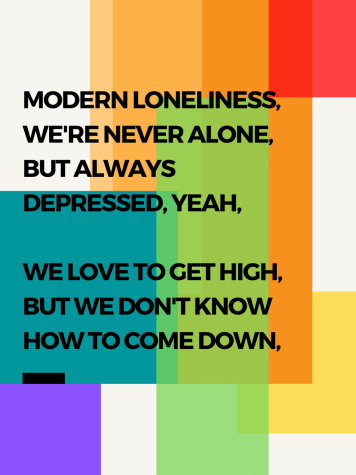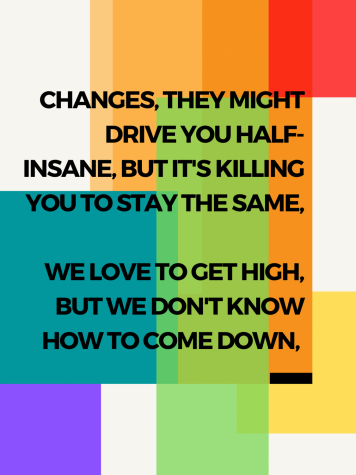How I’m feeling about ~how i’m feeling~
Lauv captures the difficulty of coping with emotions in this era
The cover for Lauv’s debut album ~how i’m feeling~ featuring Lauv with six miniature Lauvs
March 9, 2020
American singer Lauv released his debut album, “~how i’m feeling~,” on March 6, and as the name suggests, it manages to communicate, with its relatable lyrics and beautiful vocals, exactly how we are all feeling.
The album is long — 21 songs — but by releasing nine of them beforehand, Lauv managed to curb the disadvantages of a lengthy album. Additionally, by collaborating with six different artists — Annie-Marie, Alessia Cara, LANY, BTS, Troye Sivan and Sofia Reyes — the album ensures a diversity of voices and very little redundancy.
Yet Lauv’s album is more than just collaborations and length — perhaps its most engaging feature is the meaning behind these songs. Music is a means of communication like no other, and Lauv manages to perfectly resonate with the millennial generation and the unique struggles they face, especially ones pertaining to feeling lost, lonely and trapped in the age of technology. And most of all, Lauv addresses the complexities of effectively coping with this myriad of (referring to mostly negative) emotions.
One of Lauv’s recent tweets joked about having the word “lonely” in three of the songs — “Lonely Eyes,” “f—, i’m lonely” and “Modern Loneliness” — and despite critics labelling this as redundant, he artfully encapsulates this universal emotion in three unique ways. “f—, i’m lonely,” a collaboration with Anne-Marie, is an upbeat pop song, providing a rare glance into an often meaningless dating culture. Lauv explains that although it “kind of sounds like it’s about a relationship, it’s really just about missing somebody that you used to hook up with,” which is perhaps a harsh, yet relevant critique.
The other two songs that touch on this feeling of being alone are “Lonely Eyes” (my personal favorite song on the album) and “Modern Loneliness,” both of which are slower and feature soft piano backgrounds. Not only do his vocals and the accompanying music contribute to these songs’ strengths, but the lyrics perfectly supplement them. In “Lonely Eyes,” Lauv sings, “Now she goes on vacation / In expensive places / To get away from her mind,” emphasizing this theme of people choosing to escape rather than confront their feelings. “Modern Loneliness,” following a similar theme, says “Modern loneliness / We’re never alone / but always depressed, yeah,” and later says “We love to get high, but we don’t know how to come down,” once again alluding to this dilemma of being surrounded by people, yet being unable to emotionally connect with them.

Despite the majority of the songs on this album (and honestly, the entirety of the pop world) focusing on love, two songs stood out to me: “Canada,” featuring Alessia Cara, and “For now.” “Canada” is a sweet slow song, with the dual chorus adding dimension and emotion throughout, and the lyrics once again resonating with the escape attitude Lauv seems to emphasize. The song also has a storytelling sort of vibe — it’s about a couple leaving everything behind and moving to Canada — and despite the aforementioned escape attitude, is more optimistic and romantic.
“For Now,” perhaps the most emotional song on the album, also provides a different perspective into relationships, meant to resonate most with audiences who have gone through or are going through long-distance relationships. A strumming guitar in the background, coupled with a slow pace and emotional vocals all come together to create a moving piece. Lauv says that, “for now, I’ll love you through the phone,” and later says “I’m really gonna miss you / but I’ll kiss you through the screen,” which contrasts with songs like “Drugs and the Internet” that criticize the dangerous nature of technology. Instead, “For Now” adds a silver lining to using technology — it helps people out of their loneliness, bridging gaps such as distance.
Ultimately, Lauv’s dominant and, for me, most unique goal for this album was to communicate something obvious, yet elusive, about feelings — that they exist.
He realizes that often, these feelings are hard to cope with, and through his song “Julia,” written about his ex-Julia Michaels, sings her an emotional apology. The song has a beautiful melody and a soft, almost stripped-sounding feel. He manages to artfully express his vulnerability and regrets, therefore letting go of her in a mature way. And this is precisely what he wants his listeners to do, to effectively cope with how they are feeling.
Lauv understands, however, the difficulties that come with confronting your emotions, and acknowledges this in his song “Changes,” where he says “Changes, they might drive you half-insane / But it’s killing you to stay the same,” and along with its catchy tune and repetitive chorus, seems to almost want to permanently instill this message into the listener’s head: that change is hard, yet necessary.

It would take days to dissect every song on this masterpiece of an album, but all of them follow these same themes. Some, like “Billy,” are accompanied with a heavy bass, an intelligent technical choice that adds dimension to the song, and others, like “El Tejano,” are catchy, fast and different because of their Spanish lyrics. I will admit that some, like “Sweatpants” and “Tell My Mama” are nothing special — they are good pop songs, yet they are forgettable and seem disconnected.
As a whole, however, Lauv manages to nearly perfectly communicate his feelings about, well, feelings. His songs make us feel, as well as encourages us to express our feelings more constructively.
Yet simultaneously, Lauv, having been through this same cycle of difficult emotions, recognizes that this is hard to do, offering us reassurance with the last lyrics of “Changes,” telling us that “it’s all gonna work out, it’s all gonna work out someday.”


















